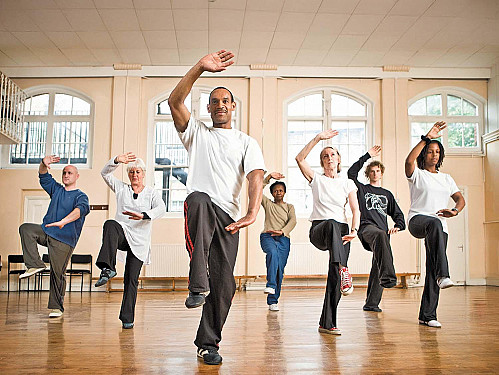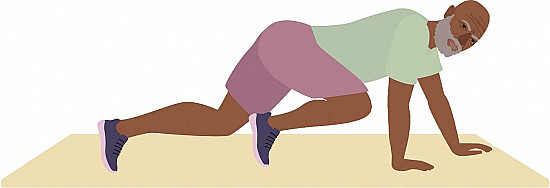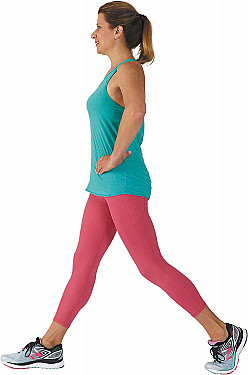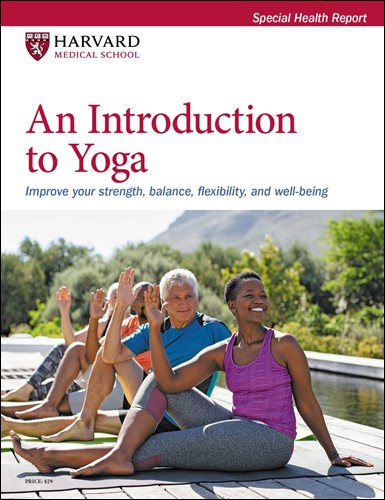Yoga: A flexible way to enhance heart health
This adaptable practice targets several fitness goals at once — and may also boost mental and physical health.
- Reviewed by Christopher P. Cannon, MD, Editor in Chief, Harvard Heart Letter; Editorial Advisory Board Member, Harvard Health Publishing

We tend to think of exercise as movement that either raises your heart rate (aerobic exercise) or builds muscles (strength training). But two other factors — flexibility and balance — are also important for a well-rounded fitness program, especially for older adults. A yoga practice has the potential to target all four factors at the same time. What's more, a recent study suggests that yoga has modest yet positive effects on several factors linked to cardiovascular health (see "How yoga may help your heart").
"The reason behind these benefits isn't entirely clear, but we believe that multiple, simultaneous mechanisms are probably at play," says Dr. Darshan Mehta, medical director of the Harvard-affiliated Benson-Henry Institute for Mind Body Medicine. Yoga is more than simply stretching and moving into poses — it weaves together three interconnected threads: physical postures, controlled breathing, and meditation. Together, they help cultivate the relaxation response, which trains your body to be less reactive during times of stress.
How yoga may help your heartTo explore how yoga may affect cardiovascular health, a team of researchers pooled data from studies of yoga done over the past few decades. Their findings, reported in the May 2023 Current Problems in Cardiology, are summarized below. When: The analysis combined results from 64 randomized controlled trials of yoga published from 1989 to 2022. Most were done in Southeast Asia. Who: The analysis included nearly 17,000 people in all, roughly half of whom performed yoga. Those in control groups did other types of gentle exercise, stretching, or no exercise. Their average age was 56. Key findings: Compared with those in control groups, people who did yoga had systolic blood pressure values (the first number in a reading) that were 4.5 points lower and levels of harmful LDL cholesterol that were 7.6 points lower, on average. Yoga was also linked to slightly lower HbA1c levels (a measure of average blood sugar over the past few months) and a small drop in body mass index. |
How yoga helps
The relaxation response not only slows the heart rate and lowers blood pressure, it may also tamp down inflammation and promote favorable changes in blood vessel function that protect the heart. As a mind-body practice, yoga encourages people to slow down and be more mindful about heart-healthy behaviors, such as eating well and getting enough sleep, says Dr. Mehta. Those habits — along with positive emotions that some forms of yoga aim to inspire, such as compassion and gratitude — may also help foster cardiovascular health.
Finding your fit
Think you can't do yoga because you aren't flexible? "By practicing yoga, you become more flexible — that's another reason to do it," says clinical social worker and yoga teacher Laura Malloy, director of yoga programs at the Benson-Henry Institute. If you're new to yoga, seek out a beginner or "gentle" class, especially if you're over 65 or have any medical conditions. Several forms are well suited to beginners, such as Hatha yoga, which features gentle, smooth movements that are integrated with your breathing. Iyengar is similar but places more emphasis on body alignment and balance and uses props such as straps, blankets, and blocks. Yin yoga, which is done mostly sitting or lying down, encourages people to go deeper into poses by holding them longer.
Another option is chair yoga, practiced sitting in a chair or standing using a chair for support. It's good for older people or anyone who feels less steady or has trouble getting up from the floor, says Malloy. Though gentle, chair yoga still provides results. "After I teach a 20-minute chair yoga class, I've heard people say "Wow, that made such a difference in how I feel!'" says Malloy. (You can try one of her 30-minute instructional videos here: health.harvard.edu/cy.
You can find classes at dedicated yoga studios as well as at health clubs, community or senior centers, or even hospitals. Costs range from about $15 to $20 per class. Yoga of the Heart, a form of yoga designed for specifically for people with heart disease, is taught by instructors trained and certified by Nischala Joy Devi, who developed the yoga portion of the Dean Ornish Program for Reversing Heart Disease, an evidence-based, integrated lifestyle program for heart patients. Click the "teacher directory" tab at health.harvard.edu/hy to search for trained instructors near you.
Image: © Alistair Berg/Getty Images
About the Author

Julie Corliss, Executive Editor, Harvard Heart Letter
About the Reviewer

Christopher P. Cannon, MD, Editor in Chief, Harvard Heart Letter; Editorial Advisory Board Member, Harvard Health Publishing
Disclaimer:
As a service to our readers, Harvard Health Publishing provides access to our library of archived content. Please note the date of last review or update on all articles.
No content on this site, regardless of date, should ever be used as a substitute for direct medical advice from your doctor or other qualified clinician.
















